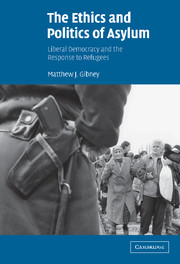Book contents
- Frontmatter
- Contents
- Acknowledgements
- Introduction
- 1 Partiality: community, citizenship and the defence of closure
- 2 Impartiality: freedom, equality and open borders
- 3 The Federal Republic of Germany: the rise and fall of a right to asylum
- 4 The United Kingdom: the value of asylum
- 5 The United States: the making and breaking of a refugee consensus
- 6 Australia: restricting asylum, resettling refugees
- 7 From ideal to non-ideal theory: reckoning with the state, politics and consequences
- 8 Liberal democratic states and ethically defensible asylum practices
- List of references
- Index
7 - From ideal to non-ideal theory: reckoning with the state, politics and consequences
Published online by Cambridge University Press: 22 September 2009
- Frontmatter
- Contents
- Acknowledgements
- Introduction
- 1 Partiality: community, citizenship and the defence of closure
- 2 Impartiality: freedom, equality and open borders
- 3 The Federal Republic of Germany: the rise and fall of a right to asylum
- 4 The United Kingdom: the value of asylum
- 5 The United States: the making and breaking of a refugee consensus
- 6 Australia: restricting asylum, resettling refugees
- 7 From ideal to non-ideal theory: reckoning with the state, politics and consequences
- 8 Liberal democratic states and ethically defensible asylum practices
- List of references
- Index
Summary
I started this work by arguing that any critical standard for the entry policies of liberal democratic states needs to possess ethical force (be informed by a convincing value) and be sensitive to the practical reality of the agent whose action it aims to direct (have realistic expectations of what states can do). In this chapter, I will illustrate the complications and challenges of moving from ideal ethical theory to practical prescriptions for actually existing states in their dealings with refugees and asylum seekers, partly by drawing upon the experiences of Germany, the UK, the United States and Australia. But before undertaking this task, it is important to remember where we have been.
In the first part, I illustrated the difficulties of outlining a compelling ideal for state responsibilities in entrance. It was apparent that none of the established accounts of the responsibilities of states – communitarianism, conservatism, nationalism, utilitarianism or global liberalism – had a convincing claim to be the single authoritative standard for the assessment of the entry policies of states. Partialists and impartialists gave contrasting responses to the nature of the state's duties to outsiders. The partial view, which attached ultimate value to the entitlement of people to act collectively to sustain cultural communities of membership, argued that states were morally entitled to distribute membership and admission largely according to their own criteria.
- Type
- Chapter
- Information
- The Ethics and Politics of AsylumLiberal Democracy and the Response to Refugees, pp. 194 - 228Publisher: Cambridge University PressPrint publication year: 2004



